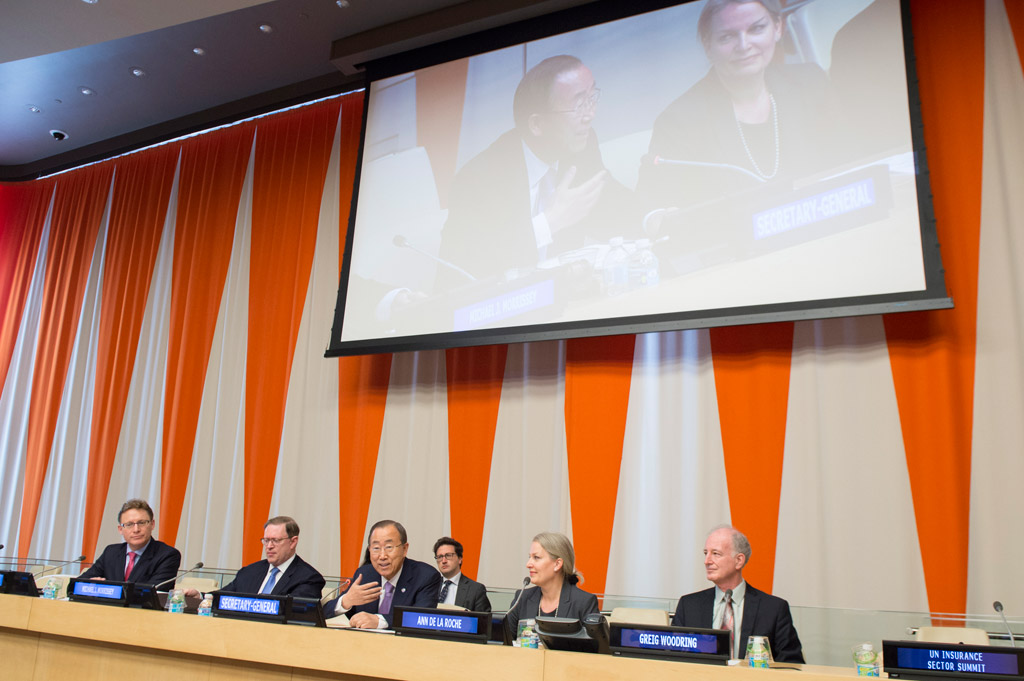Thank you for convening this Global Insurance Forum at the United Nations.
It is encouraging to see the commitment of the insurance community from over fifty countries to advance the global sustainability agenda.
This is a critical year for action.
In July, the United Nations will host the third International Conference on Financing for Development in Addis Ababa.
In September, Member States will meet in New York for a special summit on sustainable development.
And, in December, governments should adopt an ambitious, universal climate change agreement in Paris.
With these events, the world has an historic opportunity to adopt a new set of sustainable development goals and to put the world on track for long-term, low-carbon, climate-resilient growth.
People and organizations all over the world are demanding leadership and action.
Climate change impacts are accelerating.
Weather-related disasters are more frequent and more intense.
Everyone is affected, but not all equally.
We must especially help the poorest and most vulnerable people.
A disaster can wipe out decades of development gains overnight.
We must respond to the world’s growing needs with action and resources.
Both public and private sector support is needed.
The insurance industry can play an important role, especially in helping to ease the financial burden associated with disasters and to protect the vulnerable.
The insurance sector is well-placed to be a leader in risk sensitive investments.
As a major source of investment, much of it long-term, the insurance sector can and must play a strong role in shaping a more sustainable future.
This year in Paris, Governments will forge a collective response to climate change.
I have called on world leaders to ensure that adaptation and resilience are a high priority.
At their recent summit in Germany, the G7 agreed to help scale up risk reduction and resilience efforts in developing countries.
Disaster risk reduction is a front-line defence against the impact of climate change.
It is a smart, cost-effective and life-saving investment.
It is time for global action on resilience and disaster risk reduction that not only anticipates and absorbs climate risks, but also reshapes them into an opportunity for safer, sustainable development.
The insurance industry rose to the challenge in last year’s Climate Summit by announcing a commitment to double its climate-smart investment by the end of 2015.
We must ensure that commitments made at the Summit are now implemented.
I urge you to think more strategically about how climate risks can be reduced, and to adjust your investments accordingly.
I also encourage you to work with governments, especially in developing countries, to help bring about these changes.
One of the key economic insights we learned at my Climate Summit was the importance of changing the expectations of investors.
Investors today do not know whether countries are serious about tackling climate change, or if they are content to allow a high-carbon, ‘business as usual’ future, with all the risks that climate change imposes on assets and financial instruments.
That is one reason why reaching an ambitious climate change agreement in Paris is so important.
A strong agreement will provide the clear signals the private sector needs to allocate capital to build a low-carbon economy.
The insurance industry can be central in building a more resilient, climate-smart economy.
You have seen the tragic human toll rise from extreme weather events.
You know the staggering economic price tag.
I call on you to show even stronger leadership.
Voice your support for an ambitious agreement in Paris.
Heed the example of your industry leaders, including Axa, which recently pledged to decarbonize its assets.
Increase investments in resilient, low-carbon infrastructure.
And create the innovative financial tools that will make markets work for a safer climate.
To take one example, it is time to put a realistic price on carbon emissions.
This can unleash the full potential of climate finance and increase investments in resilient infrastructure.
I therefore urge you to engage with the United Nations and join our Caring for Climate initiative.
I count on you to make positive contributions towards a low-carbon, high-resilient future.
Thank you for your leadership and support.
I wish you a successful and productive Forum.
Thank you.

